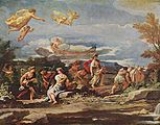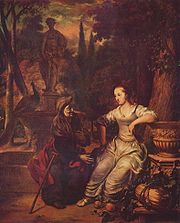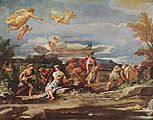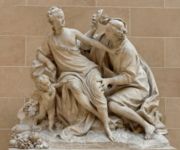
Vertumnus
Encyclopedia





Roman mythology
Roman mythology is the body of traditional stories pertaining to ancient Rome's legendary origins and religious system, as represented in the literature and visual arts of the Romans...
, Vertumnus — also Vortumnus or Vertimnus — is the god of seasons, change and plant growth, as well as gardens and fruit trees. He could change his form at will; using this power, according to Ovid
Ovid
Publius Ovidius Naso , known as Ovid in the English-speaking world, was a Roman poet who is best known as the author of the three major collections of erotic poetry: Heroides, Amores, and Ars Amatoria...
's Metamorphoses (xiv), he tricked Pomona
Pomona
Pomona was a goddess of fruitful abundance in ancient Roman religion and myth. Her name comes from the Latin word pomum, "fruit," specifically orchard fruit. She was said to be a wood nymph and a part of the Numia, guardian spirits who watch over people, places, or homes...
into talking to him by disguising himself as an old woman and gaining entry to her orchard, then using a narrative warning of the dangers of rejecting a suitor (the embedded tale of Iphis
Iphis
Iphis was a name attributed to three individuals:-Daughter of Ligdus :According to Greek mythology and the Roman poet Ovid, who wrote about transformations in his Metamorphoses, Iphis was the daughter of Telethusa and Ligdus in Crete. Ligdus had already threatened to kill his pregnant wife's...
and Anaxarete
Anaxarete
In Greek mythology, Anaxarete was a Cypriot maiden who refused the advances of a shepherd named Iphis. He cried in despair and killed himself on her doorstep, but Anaxarete was still unmoved, so Aphrodite turned her to stone....
) to seduce her. The tale of Vertumnus and Pomona was the only purely Latin tale in Ovid's Metamorphoses.
Roman cult and possible Etruscan origin
VarroMarcus Terentius Varro
Marcus Terentius Varro was an ancient Roman scholar and writer. He is sometimes called Varro Reatinus to distinguish him from his younger contemporary Varro Atacinus.-Biography:...
was convinced that Vortumnus was Etruscan, and a major god. Vertumnus' cult arrived in Rome around 300 BC, and a temple to him was constructed on the Aventine Hill
Aventine Hill
The Aventine Hill is one of the seven hills on which ancient Rome was built. It belongs to Ripa, the twelfth rione, or ward, of Rome.-Location and boundaries:The Aventine hill is the southernmost of Rome's seven hills...
by 264 BC, the date of the fall of Volsinii (Etruscan Velzna) to the Romans. Propertius
Sextus Propertius
Sextus Aurelius Propertius was a Latin elegiac poet of the Augustan age. He was born around 50–45 BC in Assisium and died shortly after 15 BC.Propertius' surviving work comprises four books of Elegies...
also asserts that the god was Etruscan, and came from Volsinii
Volsinii
Volsinii or Vulsinii , is the name of two ancient cities of Etruria, one situated on the shore of Lacus Volsiniensis , and the other on the Via Clodia, between Clusium and Forum Cassii...
.
The name Vortumnus appears to derive from Etruscan Voltumna
Voltumna
In Etruscan mythology, Voltumna or Veltha was the chthonic deity, who became the supreme god of the Etruscan pantheon, the deus Etruriae princeps, according to Varro...
. It was likely then further contaminated in popular etymology by a pre-existing Latin word vertēre meaning "to change", hence the alternative form, Vertumnus.
Sextus Propertius
Sextus Propertius
Sextus Aurelius Propertius was a Latin elegiac poet of the Augustan age. He was born around 50–45 BC in Assisium and died shortly after 15 BC.Propertius' surviving work comprises four books of Elegies...
refers to a bronze statue of Vortumnus that replaced an ancient wooden statue
Xoanon
A xoanon was an Archaic wooden cult image of Ancient Greece. Classical Greeks associated such cult objects, whether aniconic or effigy, with the legendary Daedalus. Many such cult images were preserved into historical times, though none have survived to the modern day, except where their image...
that was placed in a simple shrine called the signum Vortumni, located at the Vicus Tuscus
Vicus Tuscus
Vicus Tuscus was an ancient street in the city of Rome, running southwest out of the Forum Romanum between the Basilica Iulia and the Temple of Castor and Pollux towards the Forum Boarium and Circus Maximus via the west side of the Palatine Hill and Velabrum.-History:The name of Vicus Tuscus is...
near the Forum Romanum and decorated according to the changing seasons. The base of the statue was discovered in 1549, perhaps still in situ, but has since been lost. Its inscription referred to a restoration to the statue made in the early 4th century AD: VORTUMNUS TEMPORIBUS DIOCLETIANI ET MAXIMIANI.
Vortumnus' festival was called the Vertumnalia and was held 13 August.
The origin and nature of Vortumnus that is the subject of the elegy of Sextus Propertius
Sextus Propertius
Sextus Aurelius Propertius was a Latin elegiac poet of the Augustan age. He was born around 50–45 BC in Assisium and died shortly after 15 BC.Propertius' surviving work comprises four books of Elegies...
, our major literary source for this god, is presented as if the statue in the Vicus Tuscus were addressing a passer-by.
Ovid
Ovid
Publius Ovidius Naso , known as Ovid in the English-speaking world, was a Roman poet who is best known as the author of the three major collections of erotic poetry: Heroides, Amores, and Ars Amatoria...
recalled a time (Fasti
Fasti
In ancient Rome, the fasti were chronological or calendar-based lists, or other diachronic records or plans of official and religiously sanctioned events...
, vi, June 9 "Vestalia") when the Roman forum
Roman Forum
The Roman Forum is a rectangular forum surrounded by the ruins of several important ancient government buildings at the center of the city of Rome. Citizens of the ancient city referred to this space, originally a marketplace, as the Forum Magnum, or simply the Forum...
was still a reedy swamp, when
- That god, Vertumnus, whose name fits many forms,
- Wasn’t yet so-called from damming back the river (averso amne).
Image of Vertumnus and Pomona in later art
The subject Vertumnus and Pomona appealed to European sculptors and painters of the 16th through the 18th centuries for its opportunity to contrast young fresh female beauty with an aged croneCrone
The crone is a stock character in folklore and fairy tale, an old woman who is usually disagreeable, malicious, or sinister in manner, often with magical or supernatural associations that can make her either helpful or obstructing. She is marginalized by her exclusion from the reproductive cycle,...
, providing a wholly disguised erotic subtext,. Donald Lateiner points out that Ovid
Ovid
Publius Ovidius Naso , known as Ovid in the English-speaking world, was a Roman poet who is best known as the author of the three major collections of erotic poetry: Heroides, Amores, and Ars Amatoria...
does remark that the kisses given by Vertumnus were such as an old woman would never have given: qualia numquam vera dedisset anus: "so Circe's smile conceals a wicked intention, and Vertumnus' hot kisses ill suit an old woman's disguise".
The subject was even woven into tapestry
Tapestry
Tapestry is a form of textile art, traditionally woven on a vertical loom, however it can also be woven on a floor loom as well. It is composed of two sets of interlaced threads, those running parallel to the length and those parallel to the width ; the warp threads are set up under tension on a...
in series with the generic theme Loves of the Gods, of which the mid-sixteenth century Brussels hanging at Museu Calouste Gulbenkian
Museu Calouste Gulbenkian
Museu Calouste Gulbenkian is a museum in Lisbon, Portugal, containing a collection of ancient, and some modern art...
, Lisbon, woven to cartoons attributed to Jan Vermeyen
Jan Vermeyen
Jan Vermeyen was a goldsmith in Antwerp around 1580. He was one of the favorite artists of Emperor Rudolph II. His most famous work is the private crown of the emperor, which came later into use as Imperial Crown of Austria....
, must be among the earliest.
François Boucher
François Boucher
François Boucher was a French painter, a proponent of Rococo taste, known for his idyllic and voluptuous paintings on classical themes, decorative allegories representing the arts or pastoral occupations, intended as a sort of two-dimensional furniture...
provided designs for the tapestry-weaver Maurice Jacques at the Gobelins tapestry manufactory
Gobelins manufactory
The Manufacture des Gobelins is a tapestry factory located in Paris, France, at 42 avenue des Gobelins, near the Les Gobelins métro station in the XIIIe arrondissement...
for a series that included Vertumnus and Pomona (1775–1778), and, extending the theme of erotic disguise, Jupiter wooing Callisto
Callisto (mythology)
In Greek mythology, Callisto or Kallisto was a nymph of Artemis. Transformed into a bear and set among the stars, she was the bear-mother of the Arcadians, through her son Arcas.-Origin of the myth:...
in the guise of Diana: an example is at the J. Paul Getty Museum
J. Paul Getty Museum
The J. Paul Getty Museum, a program of the J. Paul Getty Trust, is an art museum. It has two locations, one at the Getty Center in Los Angeles, California, and one at the Getty Villa in Pacific Palisades, Los Angeles, California...
.
Mme de Pompadour, who sang well and danced gracefully, had played the role of Pomone in a pastoral
Pastoral
The adjective pastoral refers to the lifestyle of pastoralists, such as shepherds herding livestock around open areas of land according to seasons and the changing availability of water and pasturage. It also refers to a genre in literature, art or music that depicts such shepherd life in an...
presented to a small audience at Versailles
Palace of Versailles
The Palace of Versailles , or simply Versailles, is a royal château in Versailles in the Île-de-France region of France. In French it is the Château de Versailles....
; the sculpture by Jean-Baptiste Lemoyne
Jean-Baptiste Lemoyne
Jean-Baptiste Lemoyne was a French sculptor, among the greatest French portraitists. He was the pupil of his father, Jean-Louis Lemoyne, and of Robert Le Lorrain....
(1760) alludes to the event.
Joseph Brodsky
Joseph Brodsky
Iosif Aleksandrovich Brodsky , was a Russian poet and essayist.In 1964, 23-year-old Brodsky was arrested and charged with the crime of "social parasitism" He was expelled from the Soviet Union in 1972 and settled in America with the help of W. H. Auden and other supporters...
wrote a poem about Vertumnus.
Modern interpretations of Vertumnus and Pomona
David Littlefield finds in the episode a movement from rapeRape
Rape is a type of sexual assault usually involving sexual intercourse, which is initiated by one or more persons against another person without that person's consent. The act may be carried out by physical force, coercion, abuse of authority or with a person who is incapable of valid consent. The...
to mutual desire, effected against an orderly, "civilised" Latian
Latium
Lazio is one of the 20 administrative regions of Italy, situated in the central peninsular section of the country. With about 5.7 million residents and a GDP of more than 170 billion euros, Lazio is the third most populated and the second richest region of Italy...
landscape
Conversely, Roxanne Gentilcore reads in its diction and narrative strategies images of deception, veiled threat and seduction, in which Pomona, the tamed hamadryad
Hamadryad
Hamadryads are Greek mythological beings that live in trees. They are a particular type of dryad, which in turn are a particular type of nymph. Hamadryads are born bonded to a particular tree. Some believe that hamadryads are the actual tree, while normal dryads are simply the entities, or...
now embodying the orchard, does not have a voice.

